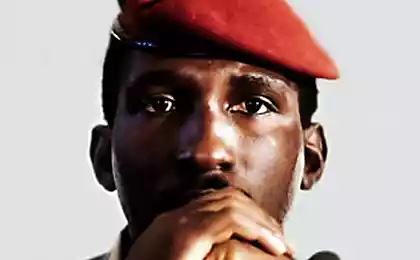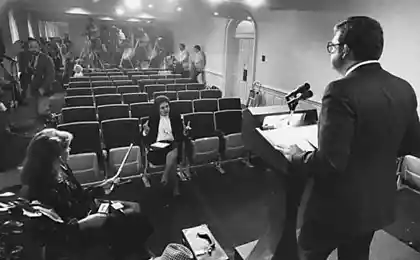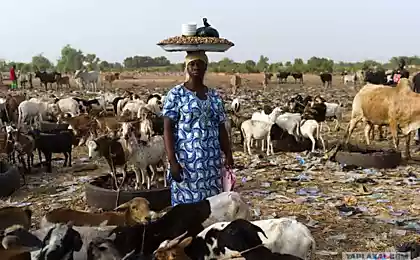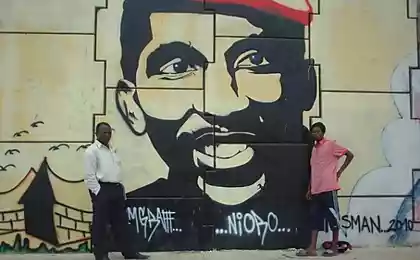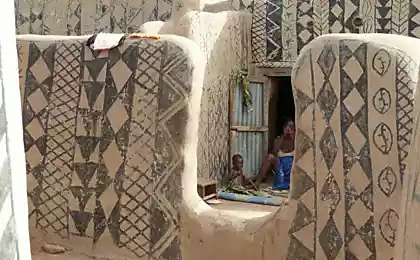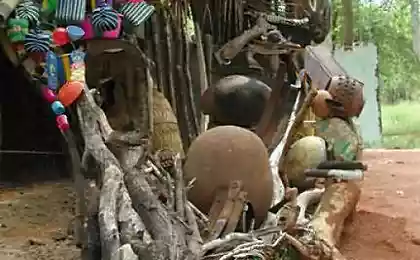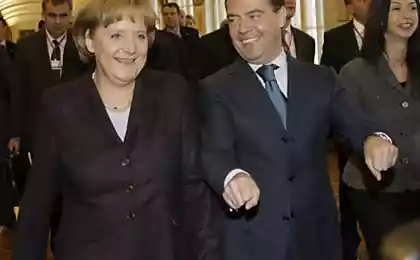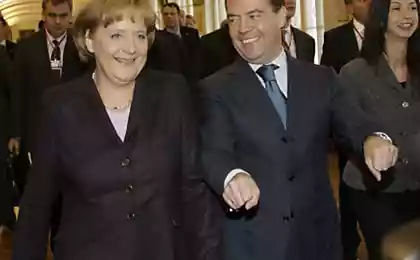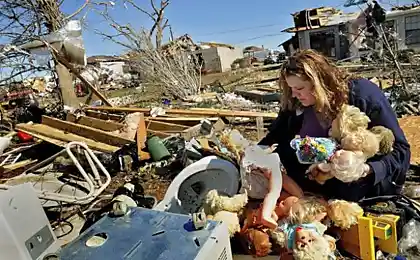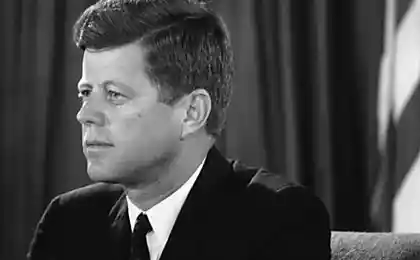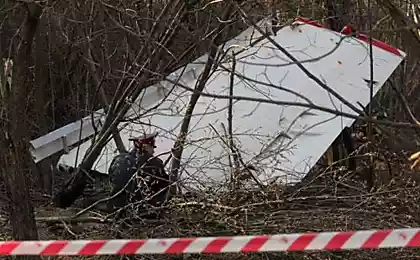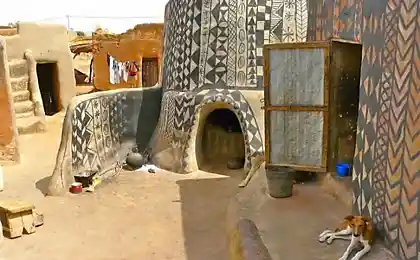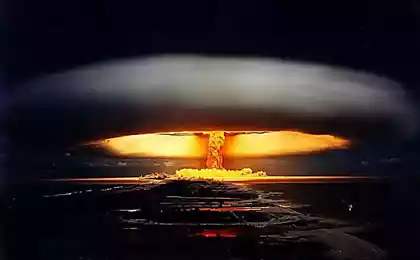1305
Thomas Isidore Noël Sankara, President of Burkina Faso.
This Thomas Isidore Noël Sankara, President of Burkina Faso.
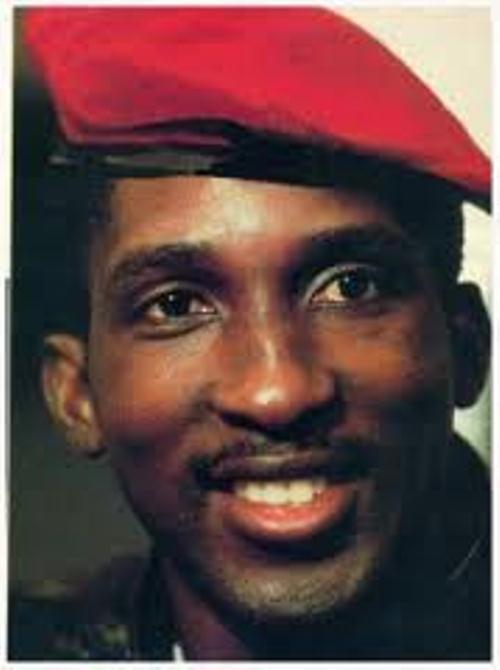
He lived on a salary army captain, is $ 345 a month, and presidential salary of $ 2,000 listed in the Orphan Fund. After the death of the president revealed that of the property belonging to him personally, any value is only an old "Peugeot" bought before coming to power, with a broken fridge freezer, three guitars and four bikes.
Sankara led the country "on a voluntary basis." He even forbade to put air conditioning in his office because he "ashamed in front of people who are incapable of such a luxury." This president does look unique example in comparison with other rulers Saharan Africa living in luxury palaces, which could easily give odds villas white colonizers, but what really there, amid all the presidents. President ascetic, has earned the nickname "African Che", and killed his friend and closest ally, has become a legend for all the people.
Quite by chance stumbled on his biography, browsing the Internet. Was extremely surprised and amazed that such people do exist.
Important to promote revolution Thomas Sankara considered a personal example. President lived on a salary army captain, is $ 450 per month, and the presidential salary of $ 2,000 listed in the Orphan Fund (after the death of Sankara turned out that his personal belongings consisted of an old car "Peugeot" bought before coming to power, the refrigerator with a broken freezer , three guitars and four bikes). One of the first innovations was the publication of his government's revenues and accounts of all government officials.
Sankara forbidden to install air conditioning in his office because he "ashamed in front of people who are incapable of such a luxury," and refused to sanction the hanging of their portraits in public places and offices in connection with the fact that "in our country, such as I am, seven million ". Was sold to the entire government fleet of "Mercedes", instead of that for the needs of ministers were acquired "Renault 5" - the cheapest at the time cars in the country.
Sankara cut the salaries of officials, and forbade them to use the personal driver for tickets and fly first class. Of officials required to change expensive Western suits to traditional cotton tunic sewn locals. Under the new year administrators obliged to pass on a monthly salary in favor of social funds. Dismissing one half of the cabinet, Sankara sent them to collective farms - to work on the ground, "where they will be of more benefit." Within three years after the arrival of Sankara to power (in 1986), the World Bank states that in Burkina Faso to eradicate corruption.
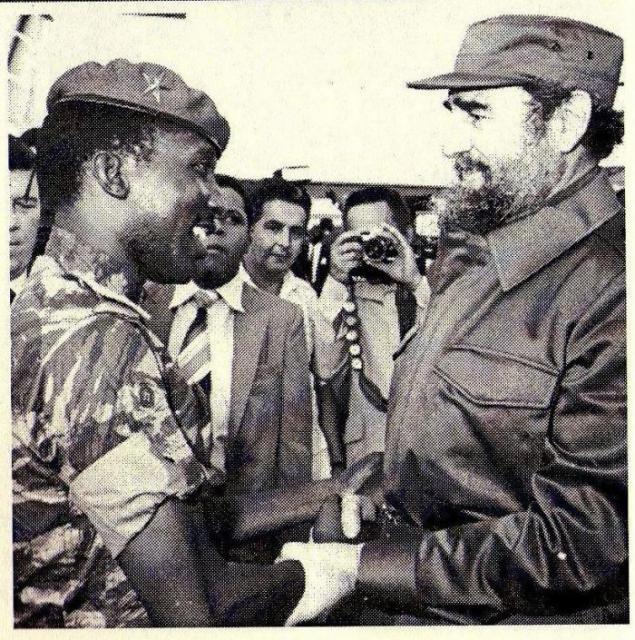
Among the objectives of Sankara - the elimination of hunger, to create a system of free education and health care, the fight against epidemics and corruption, reforestation under attack desert (during the years of his presidency were planted 10 million trees have stopped the spread of the sands of the Sahara to the south). The largest vaccination campaign began against infectious diseases 2, 5 million children in the "Battle for Health", conducted with the help of Cuban volunteers (there was not only covered the whole territory of Burkina Faso, and the border areas of neighboring countries). As a result, infant mortality before the highest in the world (280 deaths per 1,000 live births) decreased to 145 from 1000. To its credit, Sankara also set the program to build housing, debt relief to small tenants, the abolition of the poll tax, "a campaign Alpha" on literacy in nine local languages, program development of road infrastructure, the fight against "river blindness" and other local diseases.
One of the first decisions of the revolutionary power of tribal leaders became deprivation of privileges and property, the abolition of paying them tribute and compulsory detentions for the peasants. During the agrarian reform plots owned by the feudal landowners, were redistributed in favor of the processing of their peasants. As a result, three years wheat yields increased from 1,700 to 3,800 kg per hectare, which allowed the country to reach the food self-sufficiency.
Thomas Sankara proclaimed the revolution is inseparable from the question of women's liberation. His government has included a significant number of women, which previously was unprecedented for West Africa. Women in Burkina Faso were finally given equal rights with men and access to education. Sankara encourage women to join the army and created a female Guard detachment on motorcycles. To ensure the rights of women were banned barbaric custom of female genital circumcision, forced marriages and polygamy. In the first year of the revolution held a "Day of Solidarity", when the men were told to prepare lunch and go to trade on the market to themselves to experience the "charms" women's share. In Burkina Faso began the spread of contraception, and the government Sankara was the first in Africa, officially recognized the AIDS epidemic, considering it a serious threat to the African peoples.
Sankara remained sharp critic of "humanitarian aid" by the Western powers and international economic organizations, viewing it as a form of neo-colonialism.
Understandably, Sankara was nerukopozhaten and undemocratic.
Thomas Sankara was killed Oct. 15, 1987 in a coup d'état arranged by his friend and colleague, the Minister of Justice Blaise Compaore.
Blaise Compaore, the first decision as the new president was the purchase of a personal "Boeing", which went to funds earmarked for the improvement of Sankara outskirts of Ouagadougou. Then Compaoré canceled produced Sankara nationalization processes, restored significant salaries to officials and abolished the tax on medicine, introduced their income during the revolution. After the elections of 1991, which was attended by only 7% of voters (100% of which voted for the incumbent) Burkina Faso adopted under warranty France IMF loan of $ 67 million.
Sankara led the nation one of the poorest countries in the world, a country ravaged by imperialism. Upper Volta to his rise to power had the highest infant mortality rate in the world, illiteracy is almost 98 percent, the average life expectancy - 40 years.
Sankara said that the destruction of the environment, social disintegration, racism, war and plunder - the inevitable phenomenon of capitalism. Sankara knew that these conditions are not "natural", they are the product of the imperialist world order and this order must be destroyed. Sankara believed that society is built not technocrats, "financial wizards" or policy, and the masses of workers and peasants, whose work is to strengthen the social wealth, which leads to the well-being of everyone. The world can be transformed, turning the masses into active and conscious force, changing its living conditions. And the revolutionary government, which he led, the beginning of this path, mobilizing peasants, workers, artisans, women, youth, the elderly, to carry out a campaign of literacy, immunization, water supply, massively build houses and plant trees, and send the exploiters and idlers to work in the field .
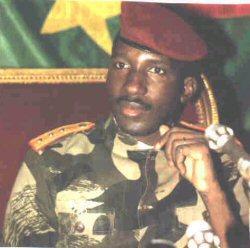
Sankara was an idealist and his weakness was the belief in the revolutionary honesty and integrity of the people around him.

He lived on a salary army captain, is $ 345 a month, and presidential salary of $ 2,000 listed in the Orphan Fund. After the death of the president revealed that of the property belonging to him personally, any value is only an old "Peugeot" bought before coming to power, with a broken fridge freezer, three guitars and four bikes.
Sankara led the country "on a voluntary basis." He even forbade to put air conditioning in his office because he "ashamed in front of people who are incapable of such a luxury." This president does look unique example in comparison with other rulers Saharan Africa living in luxury palaces, which could easily give odds villas white colonizers, but what really there, amid all the presidents. President ascetic, has earned the nickname "African Che", and killed his friend and closest ally, has become a legend for all the people.
Quite by chance stumbled on his biography, browsing the Internet. Was extremely surprised and amazed that such people do exist.
Important to promote revolution Thomas Sankara considered a personal example. President lived on a salary army captain, is $ 450 per month, and the presidential salary of $ 2,000 listed in the Orphan Fund (after the death of Sankara turned out that his personal belongings consisted of an old car "Peugeot" bought before coming to power, the refrigerator with a broken freezer , three guitars and four bikes). One of the first innovations was the publication of his government's revenues and accounts of all government officials.
Sankara forbidden to install air conditioning in his office because he "ashamed in front of people who are incapable of such a luxury," and refused to sanction the hanging of their portraits in public places and offices in connection with the fact that "in our country, such as I am, seven million ". Was sold to the entire government fleet of "Mercedes", instead of that for the needs of ministers were acquired "Renault 5" - the cheapest at the time cars in the country.
Sankara cut the salaries of officials, and forbade them to use the personal driver for tickets and fly first class. Of officials required to change expensive Western suits to traditional cotton tunic sewn locals. Under the new year administrators obliged to pass on a monthly salary in favor of social funds. Dismissing one half of the cabinet, Sankara sent them to collective farms - to work on the ground, "where they will be of more benefit." Within three years after the arrival of Sankara to power (in 1986), the World Bank states that in Burkina Faso to eradicate corruption.

Among the objectives of Sankara - the elimination of hunger, to create a system of free education and health care, the fight against epidemics and corruption, reforestation under attack desert (during the years of his presidency were planted 10 million trees have stopped the spread of the sands of the Sahara to the south). The largest vaccination campaign began against infectious diseases 2, 5 million children in the "Battle for Health", conducted with the help of Cuban volunteers (there was not only covered the whole territory of Burkina Faso, and the border areas of neighboring countries). As a result, infant mortality before the highest in the world (280 deaths per 1,000 live births) decreased to 145 from 1000. To its credit, Sankara also set the program to build housing, debt relief to small tenants, the abolition of the poll tax, "a campaign Alpha" on literacy in nine local languages, program development of road infrastructure, the fight against "river blindness" and other local diseases.
One of the first decisions of the revolutionary power of tribal leaders became deprivation of privileges and property, the abolition of paying them tribute and compulsory detentions for the peasants. During the agrarian reform plots owned by the feudal landowners, were redistributed in favor of the processing of their peasants. As a result, three years wheat yields increased from 1,700 to 3,800 kg per hectare, which allowed the country to reach the food self-sufficiency.
Thomas Sankara proclaimed the revolution is inseparable from the question of women's liberation. His government has included a significant number of women, which previously was unprecedented for West Africa. Women in Burkina Faso were finally given equal rights with men and access to education. Sankara encourage women to join the army and created a female Guard detachment on motorcycles. To ensure the rights of women were banned barbaric custom of female genital circumcision, forced marriages and polygamy. In the first year of the revolution held a "Day of Solidarity", when the men were told to prepare lunch and go to trade on the market to themselves to experience the "charms" women's share. In Burkina Faso began the spread of contraception, and the government Sankara was the first in Africa, officially recognized the AIDS epidemic, considering it a serious threat to the African peoples.
Sankara remained sharp critic of "humanitarian aid" by the Western powers and international economic organizations, viewing it as a form of neo-colonialism.
Understandably, Sankara was nerukopozhaten and undemocratic.
Thomas Sankara was killed Oct. 15, 1987 in a coup d'état arranged by his friend and colleague, the Minister of Justice Blaise Compaore.
Blaise Compaore, the first decision as the new president was the purchase of a personal "Boeing", which went to funds earmarked for the improvement of Sankara outskirts of Ouagadougou. Then Compaoré canceled produced Sankara nationalization processes, restored significant salaries to officials and abolished the tax on medicine, introduced their income during the revolution. After the elections of 1991, which was attended by only 7% of voters (100% of which voted for the incumbent) Burkina Faso adopted under warranty France IMF loan of $ 67 million.
Sankara led the nation one of the poorest countries in the world, a country ravaged by imperialism. Upper Volta to his rise to power had the highest infant mortality rate in the world, illiteracy is almost 98 percent, the average life expectancy - 40 years.
Sankara said that the destruction of the environment, social disintegration, racism, war and plunder - the inevitable phenomenon of capitalism. Sankara knew that these conditions are not "natural", they are the product of the imperialist world order and this order must be destroyed. Sankara believed that society is built not technocrats, "financial wizards" or policy, and the masses of workers and peasants, whose work is to strengthen the social wealth, which leads to the well-being of everyone. The world can be transformed, turning the masses into active and conscious force, changing its living conditions. And the revolutionary government, which he led, the beginning of this path, mobilizing peasants, workers, artisans, women, youth, the elderly, to carry out a campaign of literacy, immunization, water supply, massively build houses and plant trees, and send the exploiters and idlers to work in the field .

Sankara was an idealist and his weakness was the belief in the revolutionary honesty and integrity of the people around him.

